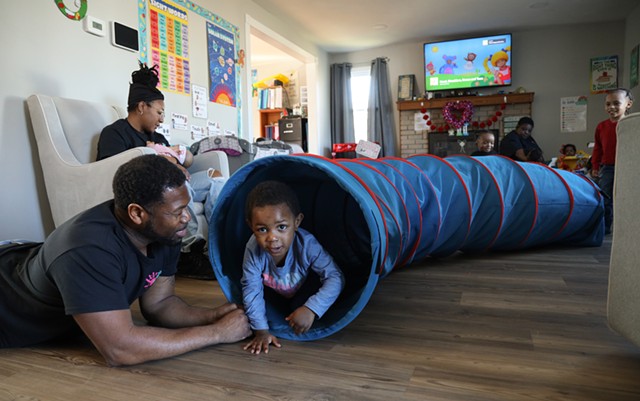
- PHOTO BY MAX SCHULTE
- Richard Morris of Morris Munchkins Playhouse in Chili cares for six month old Noemi Andrews. He and his wife, India Morris, own the home-based daycare.
As director of whole child health for Common Ground Health and president of the board of the Child Care Council, a child care referral agency, Beideman is intimately familiar with the local systems set up to support the county’s youngest residents and their families.
Yet Beideman and her husband, Craig, have been trying to find full-time care for Quinn, who is now 13 months old, since Beideman was 20 weeks pregnant with her.
They eventually had to settle on a part-time spot that they heard about through a tip from a friend. Quinn now spends two days a week at day care and two days a week being cared for by family and friends. On Fridays, Beideman works from home to be with her.

- PHOTO BY JOSH SAUNDERS
- Jenn Beideman and her husband, Craig, have struggled to find child care for their daughter, Quinn.
Their story is an all too common one. Even before the pandemic hit, parents across Monroe County struggled to find daycare spots for their children, particularly infants and toddlers. But the situation only worsened between 2020 and 2022, when the county lost 1,700 slots — roughly 6 percent of its child care capacity — according to a report for the Children’s Agenda, a child advocacy group.
Of those lost slots, nearly 700 were spread among 58 home-based daycares, which tend to be heavily used by low-income families and parents who need care for their children outside of the standard 9-to-5 workday.
The shortage is of the utmost relevance right now, as the county has tens of millions of dollars in funding to help families and, in many cases, a dearth of places to spend it.
Monroe County has roughly $90 million in child day care assistance funding on hand and officials have taken steps to make those funds more accessible to the families that could benefit from them. It has lowered the fee parents have to pay, hired Baden Street Settlement to provide navigators who can help parents find child care, and increased the number of days where it’ll pay for children receiving subsidies when they are absent from day care.
The county also raised the eligibility threshold for funding to 300 percent of the federal poverty level, which is roughly $80,000 for a family of four.
But all of it is for naught if parents who qualify for help can’t find child care openings.
“We probably have more child care funding in our budget than we've historically seen in years,” said Thalia Wright, Monroe County’s human services commissioner. “So now the pivot is to work with providers to get providers back online, to help support providers.”
Providers not paid enough
Safe and supportive child day care is a vital resource for working parents and their children, whose brains are developing at a rapid clip and need nurturing to flourish.“Us as the provider, we give these parents peace of mind so they can continue to work without any worries,” said Richard Morris of Morris Munchkins Playhouse, a home-based daycare in Chili.

- PHOTO BY MAX SCHULTE
- Richard Morris plays with 2-year-old Legend Sirman at Morris Munchkins Playhouse in Chili.
The jobs often require bachelor’s degrees or professional credentialing, training in CPR and first aid, and experience working in child care. But the pay frequently starts below $20 an hour. In 2021, the average yearly wages for a child care worker in Monroe County were $27,467, according to state Department of Labor data.
“We just can’t get anyone at the low, low wages,” said Assemblymember Sarah Clark, a Democrat from Rochester who is deeply involved in child care issues. “It’s a high-responsibility job and it pays less than McDonald’s or Walmart.”
Providers can’t just raise rates to pay their people more. They not only have to cover overheard like insurance, utilities, food, and employee wages, but also consider what parents can afford. In the case of parents receiving child care assistance, providers can only count on getting the state-set market rate.
The current market rate for daycare in Monroe County can exceed $300 a week for children under 2, and creep close to $300 for children older than that, according to state data.
“Does it average out? Usually it doesn’t,” said Armett Barnes, owner of Armett's Care and Share Family Daycare, a home-based provider in Irondequoit. Her license allows her to care for 16 children at a time, and she has a waitlist.
What to do about it?
Monroe County officials said they are working with advocates and lawmakers to shore up the local child day care system using some of the child care assistance funding it has.For example, Wright, the human services commissioner, said the county plans to use some of that money to help providers offer transportation for children. That would help parents who don’t have automobiles and it could help bring some day care providers back online, she added.

- PHOTO PROVIDED
- Assemblymember Sarah Clark
Clark has sponsored legislation that would increase the payment daycares receive when they provide care for children during non-traditional hours. The bill has support from other area Democrats.
She has also introduced legislation that would direct the state to study what it actually costs to provide child care and to use that data to set subsidy payment rates instead of using the market rates. While Clark wants the state to move to some form of a universal child care system, she said she believes that, in the meantime, the state needs to boost what providers are paid.
“If they actually were able to do a study on what their true cost was, you’d actually be able to look at wages and put in wages that are much more acceptable for the expertise and responsibility of our child care workers, and we haven’t done it,” Clark said. “I think we're afraid to do it because we know it will cost a lot of money.
“But now that money is not an issue I think we really need to start looking at what we're doing to raise wages in the child care workforce.”
Jeremy Moule is CITY's deputy editor. He can be reached at [email protected].
